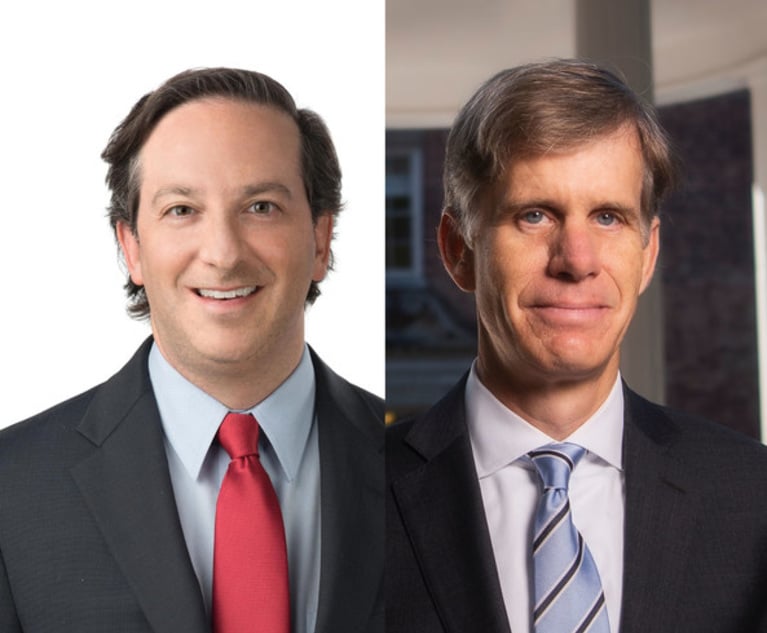ACLU Alleges Discrimination Over Prison Visitor's Christian Head Covering
“Last year, the United States Penitentiary of Atlanta unlawfully discriminated against Mrs. Ragland because of her Christian beliefs when you demanded that she remove her head covering before she was permitted to visit her brother," ACLU of Georgia lawyers said.
November 16, 2017 at 07:18 PM
7 minute read

The ACLU of Georgia has alleged that an Atlanta federal prison discriminated against a woman visiting the facility for wearing a Christian head covering.
“We represent Audra Ragland, a devout Christian woman who covers her head for religious reasons,” Sean Young, legal director for the ACLU of Georgia, and Heather Weaver, staff attorney for the ACLU Program on Freedom of Religion & Belief, said in a letter sent to the prison Thursday.
“Last year, the United States Penitentiary of Atlanta unlawfully discriminated against Mrs. Ragland because of her Christian beliefs when you demanded that she remove her head covering before she was permitted to visit her brother, who was incarcerated in the United States Penitentiary of Atlanta at the time,” the lawyers said.
The prison warden and public information officer could not be reached immediately.
The lawyers said their client did not report the incident immediately because she feared that her brother would face retaliation for her complaint. Now that he has been released, she “seeks to ensure that no Christian will face the same kind of religious discrimination that she faced that day, and to raise awareness of the fact that some Christian women choose to cover their hair based on Scripture.”
The letter said Ragland traveled nearly 150 miles from her home in South Carolina in September 2016 to visit her brother at the Atlanta federal penitentiary. “When she arrived, she was told to remove her head covering. When she explained that she covered her head for religious reasons, the officer interrogated her about her religious identity. Once she identified herself as a Christian, the officer refused to allow her to proceed through security,” the ACLU lawyers said. They said the officer told her that a Christian belief in head covering was not “recognized,” but that if she were “Muslim or Jewish,” then the scarf she wore would have been “fine.”
“Mrs. Ragland offered to explain her religious beliefs by pointing to 1 Corinthians 11 in the Bible, but the officer repeated that the facility does not recognize Christian covering,” the lawyers said.
“Desperate to see her brother, Mrs. Ragland was forced to remove her head covering against her religious beliefs. She felt defeated and ashamed, as if she were disobeying what God had led her to do,” the lawyers said. “When she reentered the facility without her head covering, she felt exposed and embarrassed as she had to walk in front of so many men whom she did not know. Though she was relieved to see her brother, she felt sickened that she had to potentially compromise her faith to do so, and that the facility would discriminate against her because of the staff's ignorance about Christianity.”
The lawyers said in a news release that permitting people of one religion to wear a head covering while denying the same to others constitutes religious discrimination in violation of the First Amendment, the U.S. Bureau of Prisons' policy governing visitors' religious head wear and the U.S. Penitentiary of Atlanta's policies.
“Forcing Mrs. Ragland to choose between her faith and her family is outrageous, constitutionally repugnant, and wrong,” Young said in the news release. “Officials have no business demanding that we conform to the government's interpretation of Scripture or of any other religious text.”
“Please inform us by what steps you will take to ensure that this does not happen again,” the letter said. “Otherwise, your facility will continue to be exposed to potential civil liability.”

The ACLU of Georgia has alleged that an Atlanta federal prison discriminated against a woman visiting the facility for wearing a Christian head covering.
“We represent Audra Ragland, a devout Christian woman who covers her head for religious reasons,” Sean Young, legal director for the ACLU of Georgia, and Heather Weaver, staff attorney for the ACLU Program on Freedom of Religion & Belief, said in a letter sent to the prison Thursday.
“Last year, the United States Penitentiary of Atlanta unlawfully discriminated against Mrs. Ragland because of her Christian beliefs when you demanded that she remove her head covering before she was permitted to visit her brother, who was incarcerated in the United States Penitentiary of Atlanta at the time,” the lawyers said.
The prison warden and public information officer could not be reached immediately.
The lawyers said their client did not report the incident immediately because she feared that her brother would face retaliation for her complaint. Now that he has been released, she “seeks to ensure that no Christian will face the same kind of religious discrimination that she faced that day, and to raise awareness of the fact that some Christian women choose to cover their hair based on Scripture.”
The letter said Ragland traveled nearly 150 miles from her home in South Carolina in September 2016 to visit her brother at the Atlanta federal penitentiary. “When she arrived, she was told to remove her head covering. When she explained that she covered her head for religious reasons, the officer interrogated her about her religious identity. Once she identified herself as a Christian, the officer refused to allow her to proceed through security,” the ACLU lawyers said. They said the officer told her that a Christian belief in head covering was not “recognized,” but that if she were “Muslim or Jewish,” then the scarf she wore would have been “fine.”
“Mrs. Ragland offered to explain her religious beliefs by pointing to 1 Corinthians 11 in the Bible, but the officer repeated that the facility does not recognize Christian covering,” the lawyers said.
“Desperate to see her brother, Mrs. Ragland was forced to remove her head covering against her religious beliefs. She felt defeated and ashamed, as if she were disobeying what God had led her to do,” the lawyers said. “When she reentered the facility without her head covering, she felt exposed and embarrassed as she had to walk in front of so many men whom she did not know. Though she was relieved to see her brother, she felt sickened that she had to potentially compromise her faith to do so, and that the facility would discriminate against her because of the staff's ignorance about Christianity.”
The lawyers said in a news release that permitting people of one religion to wear a head covering while denying the same to others constitutes religious discrimination in violation of the First Amendment, the U.S. Bureau of Prisons' policy governing visitors' religious head wear and the U.S. Penitentiary of Atlanta's policies.
“Forcing Mrs. Ragland to choose between her faith and her family is outrageous, constitutionally repugnant, and wrong,” Young said in the news release. “Officials have no business demanding that we conform to the government's interpretation of Scripture or of any other religious text.”
“Please inform us by what steps you will take to ensure that this does not happen again,” the letter said. “Otherwise, your facility will continue to be exposed to potential civil liability.”
This content has been archived. It is available through our partners, LexisNexis® and Bloomberg Law.
To view this content, please continue to their sites.
Not a Lexis Subscriber?
Subscribe Now
Not a Bloomberg Law Subscriber?
Subscribe Now
NOT FOR REPRINT
© 2025 ALM Global, LLC, All Rights Reserved. Request academic re-use from www.copyright.com. All other uses, submit a request to [email protected]. For more information visit Asset & Logo Licensing.
You Might Like
View All

On The Move: Ex-Partner Returns to Lead Nelson Mullins Corporate Group, Burr & Forman Hires University GC as COO
5 minute read
Law Firm Sued for Telemarketing Calls to Customers on Do Not Call Registry

Evidence Explained: Prevailing Attorney Outlines Successful Defense in Inmate Death Case
Trending Stories
Who Got The Work
J. Brugh Lower of Gibbons has entered an appearance for industrial equipment supplier Devco Corporation in a pending trademark infringement lawsuit. The suit, accusing the defendant of selling knock-off Graco products, was filed Dec. 18 in New Jersey District Court by Rivkin Radler on behalf of Graco Inc. and Graco Minnesota. The case, assigned to U.S. District Judge Zahid N. Quraishi, is 3:24-cv-11294, Graco Inc. et al v. Devco Corporation.
Who Got The Work
Rebecca Maller-Stein and Kent A. Yalowitz of Arnold & Porter Kaye Scholer have entered their appearances for Hanaco Venture Capital and its executives, Lior Prosor and David Frankel, in a pending securities lawsuit. The action, filed on Dec. 24 in New York Southern District Court by Zell, Aron & Co. on behalf of Goldeneye Advisors, accuses the defendants of negligently and fraudulently managing the plaintiff's $1 million investment. The case, assigned to U.S. District Judge Vernon S. Broderick, is 1:24-cv-09918, Goldeneye Advisors, LLC v. Hanaco Venture Capital, Ltd. et al.
Who Got The Work
Attorneys from A&O Shearman has stepped in as defense counsel for Toronto-Dominion Bank and other defendants in a pending securities class action. The suit, filed Dec. 11 in New York Southern District Court by Bleichmar Fonti & Auld, accuses the defendants of concealing the bank's 'pervasive' deficiencies in regards to its compliance with the Bank Secrecy Act and the quality of its anti-money laundering controls. The case, assigned to U.S. District Judge Arun Subramanian, is 1:24-cv-09445, Gonzalez v. The Toronto-Dominion Bank et al.
Who Got The Work
Crown Castle International, a Pennsylvania company providing shared communications infrastructure, has turned to Luke D. Wolf of Gordon Rees Scully Mansukhani to fend off a pending breach-of-contract lawsuit. The court action, filed Nov. 25 in Michigan Eastern District Court by Hooper Hathaway PC on behalf of The Town Residences LLC, accuses Crown Castle of failing to transfer approximately $30,000 in utility payments from T-Mobile in breach of a roof-top lease and assignment agreement. The case, assigned to U.S. District Judge Susan K. Declercq, is 2:24-cv-13131, The Town Residences LLC v. T-Mobile US, Inc. et al.
Who Got The Work
Wilfred P. Coronato and Daniel M. Schwartz of McCarter & English have stepped in as defense counsel to Electrolux Home Products Inc. in a pending product liability lawsuit. The court action, filed Nov. 26 in New York Eastern District Court by Poulos Lopiccolo PC and Nagel Rice LLP on behalf of David Stern, alleges that the defendant's refrigerators’ drawers and shelving repeatedly break and fall apart within months after purchase. The case, assigned to U.S. District Judge Joan M. Azrack, is 2:24-cv-08204, Stern v. Electrolux Home Products, Inc.
Featured Firms
Law Offices of Gary Martin Hays & Associates, P.C.
(470) 294-1674
Law Offices of Mark E. Salomone
(857) 444-6468
Smith & Hassler
(713) 739-1250






